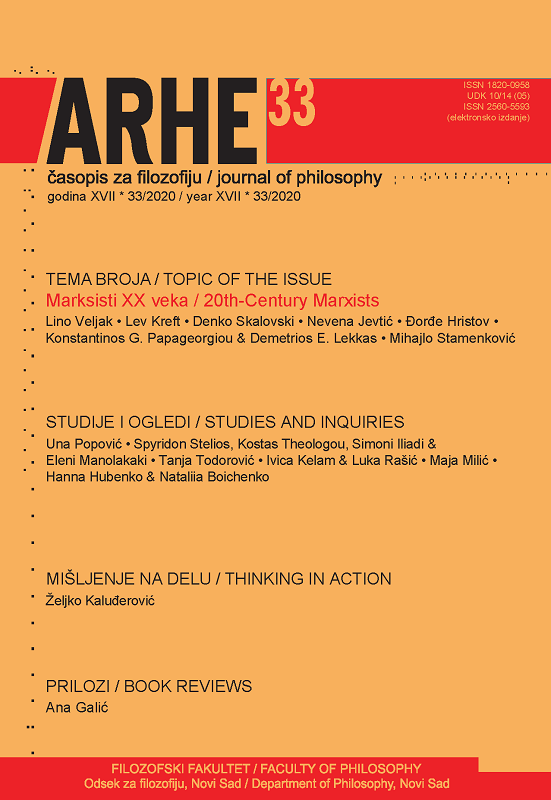TO HAVE THE PLANET OR TO BE HUMANITY (Erich Fromm: 1900-1980-2020)
Main Article Content
Abstract
Erich Fromm is a thinker (philosopher/anthropologist/psychoanalyst) who reflects and criticizes in his famous book Having or Being, the value system that has been effective in the last 200 years of global capitalist modernization and several phases of (post)industrial development, and which system has managed to penetrate in all spheres and pores of human life, and to cause not only positive, but even more negative, paradoxical and dangerous, self-destructive, pathological effects on human civilization and culture on a global level. (Marx, Lukács, Habermas, Honneth) Of course, it is about highly developed capitalist system in a highly developed industrial societies/states, and about the necessary and definite/urgent need to overcome it at all levels on which it has managed to penetrate, including the most intimate and deepest, "private" layers/spheres of human psychosomatics and human individual spirit in the social/collective conditions of, in Fromm's opinion, "sick society". At first glance, this society manifests itself as normal, but in essence it is a "pathology of normalcy", which is most manifested through the phenomenon of fetishism and alienation, term that was once developed by Hegel, then accepted by Feuerbach, and finally by Marx. Profit, as the basic motive and spiritus movens of capitalist production, which permeates all spheres and pores of human life, is a general quantification and abstraction that turns specific individual characteristics/ potentials into goods for the market (labor and capital), and finally results in a universal/total phenomenon such as alienation and the ubiquity of its mass pathological manifestation.(Honneth) As a great historical alternative to such a society From sees in the reactualization of the idea of socialism. (Honneth).
Article Details
References
Bloch, E., Princip nada, I-III, Naprijed, Zagreb, 1981;
Chomsky, N., Gramatika i um, Nolit, Beograd, 1972;
Давчев, В., Аналитичката философија и ‘дух-тело ’интеракцијата, Аз-Буки, Скопје, 2010;
Донев, Д., Вовед во етиката, УКИМ, Скопје, 2018;
Flego, G., Frommovo shvaćanje čovjeka, u: Fromm, E., Imati ili biti?, Naprijed, Zagreb, 1984, (9-42);
Frojd, S., Odabrana dela Sigmunda Frojda (I-VIII), Matica srpska, Novi Sad, 1976;
Fromm, E., DJELA u 12 svezaka, Naprijed, Zagreb/Nolit, Beograd, 1984;
Fromm, E., Imati ili biti?, Naprijed, Zagreb, 1980;
Fromm, E., S onu stranu okova iluzije: Moj susret s Marxom i Freudom, Naprijed, Zagreb, 1980а;
From, E., Zdravo društvo, Rad, Beograd, 1980в;
Fromm, E., Wege aus einer kranken Gesellschaft: Eine sozialpsychologische Untersuchung, dtv, München, 2006;
Фром, Е., За непослушноста и други есеи, Комунист, Скопје, 1989;
Фром, Е., Ќе бидете како богови. Радикално толкување на Стариот завет и на неговата традицијa, Ѓурѓа, Скопје, MMVIII (2008);
Funk, R.,/McLaughin, N., (Eds.), Towards a Human Science: The Relevance of Erich Fromm for Today, Psychosozial-Verlag, Giesen, 2015;
Funk, R., Mut zum Menschen: Erich Fromms Denken und Werk, seine humanistische Religion und Ethik, Deutsche Verlags-Anstalt, Stuttgart, 1978;
Gete, J. W., Faust, (Dvojezično izdanje), Nolit, Beograd, 1976;
Habermas, J., Teorija i praksa: Socijalfilozofske studije, Bigz, Beograd, 1980;
Honneth, A., (Hg.)., Pathologien des Sozialen: Die Aufgaben der Sozialphilosophie, Fischer, Frankfurt/M., 1994;
Honet, A., Borba za priznanje: moralna gramatika društvenih sukoba, Libertas, Albatros Plus, Beograd, 2009;
Honneth, A., The Patologies of Individual Freedom: Hegel`s Social Theory, Princeton University Press, Princeton,2010;
Honet, A., Ideja socijalizma: Pokušaj osavremenjivanja, Akademska knjiga, Novi Sad 2019, (nem. Honneth, A., Die Idee des Sozialismus: Versuch einer Aktualisierung, Suhrkamp, Berlin, 2015;)
Хонет, А., Постварување: Студија од областа на теоријата на признавањето, Аз-Буки, Скопје, 2013;
Jay, M., The Dialectical Imagination: A History of the Frankfurt School and the Institute of Social Research 1923-1950, University of California Press, Berkeley - Los Angeles - London, 1996;
Jonas, H., Princip odgovornost. Pokušaj jedne etike za tehnološku civilizaciju, Veselin Masleša, Sarajevo, 1990;
Kolakovski, L., Glavni tokovi marksizma, III, Bigz, Beograd, 1985, (430-438);
Lukacs, G., Povijest i klasna svijest: Studija o marksističkoj dijalektici, Naprijed, Zagreb, 1977;
Маркс, К.,/Енгелс, Ф., Манифест на комунистичката партија, Аз-Буки, Скопје, 2008;
Marks, K., Kapital: Kritika političke ekonomije (I-III), Prosveta, Beograd, 1977;
Marcel, G., Being and Having: An Existential Diary, Harper and Row, Torchbooks, New York, 1965;
Свендсен, Л. Ф. Х., Филозофија на здодевноста, Виг Зеница, Скопје, 2010;
Скаловски, Д., Модерната философска антропологија версус генетичкиот инженеринг: Ерих Фром (1900-1980-2020), у: Филозофска трибина, бр. ???, Скопје 2020, (стр. ???-???);
Скаловски, Д., Етика на одговорноста (Ханс Јонас), Bigoss, Скопје, 1995/2005;
Staehelin, B., Haben und Sein, Editio Academica, Zürich, 1969;
Suzuki, D.T.,/From, E., Zen budizam i psihoanaliza, Nolit, Beograd, 1977;
Schweitzer, A., Der Schuld der Philosophie an dem Niedergang der Kultur. Gesammelte Werke, tom. 2. Zürich, Buchclub Ex Libris, 1923;
Џепароски, И. (прир.), Аспекти на другоста: зборник по културологија, Евро-Балкан Прес-Менора,Скопје, 2007;
Šekspir, W., Hamlet, Rad, Beograd, 1964;
Trebješanin, Ž., Fromove dihotomije, Nolit, Beograd, 1983;
Зиновјев, А., Велика прекеретница, Наш Дом/L`Age d`Homme, 1999.
